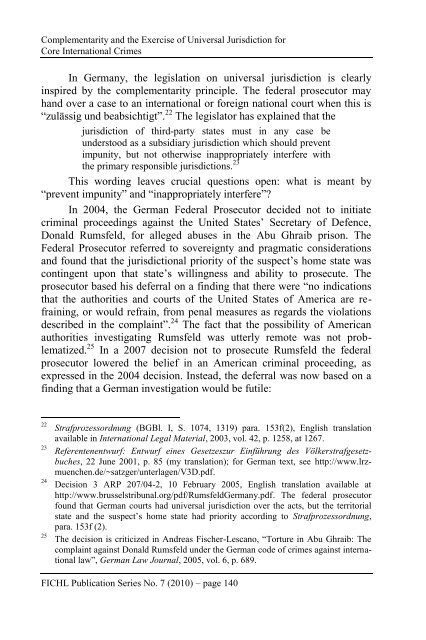Complementarity: Contest or Collaboration? - FICHL
Complementarity: Contest or Collaboration? - FICHL
Complementarity: Contest or Collaboration? - FICHL
Create successful ePaper yourself
Turn your PDF publications into a flip-book with our unique Google optimized e-Paper software.
<strong>Complementarity</strong> and the Exercise of Universal Jurisdiction f<strong>or</strong><br />
C<strong>or</strong>e International Crimes<br />
In Germany, the legislation on universal jurisdiction is clearly<br />
inspired by the complementarity principle. The federal prosecut<strong>or</strong> may<br />
hand over a case to an international <strong>or</strong> f<strong>or</strong>eign national court when this is<br />
“zulässig und beabsichtigt”. 22 The legislat<strong>or</strong> has explained that the<br />
jurisdiction of third-party states must in any case be<br />
understood as a subsidiary jurisdiction which should prevent<br />
impunity, but not otherwise inappropriately interfere with<br />
the primary responsible jurisdictions. 23<br />
This w<strong>or</strong>ding leaves crucial questions open: what is meant by<br />
“prevent impunity” and “inappropriately interfere”?<br />
In 2004, the German Federal Prosecut<strong>or</strong> decided not to initiate<br />
criminal proceedings against the United States‟ Secretary of Defence,<br />
Donald Rumsfeld, f<strong>or</strong> alleged abuses in the Abu Ghraib prison. The<br />
Federal Prosecut<strong>or</strong> referred to sovereignty and pragmatic considerations<br />
and found that the jurisdictional pri<strong>or</strong>ity of the suspect‟s home state was<br />
contingent upon that state‟s willingness and ability to prosecute. The<br />
prosecut<strong>or</strong> based his deferral on a finding that there were “no indications<br />
that the auth<strong>or</strong>ities and courts of the United States of America are refraining,<br />
<strong>or</strong> would refrain, from penal measures as regards the violations<br />
described in the complaint”. 24 The fact that the possibility of American<br />
auth<strong>or</strong>ities investigating Rumsfeld was utterly remote was not problematized.<br />
25 In a 2007 decision not to prosecute Rumsfeld the federal<br />
prosecut<strong>or</strong> lowered the belief in an American criminal proceeding, as<br />
expressed in the 2004 decision. Instead, the deferral was now based on a<br />
finding that a German investigation would be futile:<br />
22 Strafprozess<strong>or</strong>dnung (BGBl. I, S. 1074, 1319) para. 153f(2), English translation<br />
available in International Legal Material, 2003, vol. 42, p. 1258, at 1267.<br />
23 Referentenentwurf: Entwurf eines Gesetzeszur Einführung des Völkerstrafgesetzbuches,<br />
22 June 2001, p. 85 (my translation); f<strong>or</strong> German text, see http://www.lrzmuenchen.de/~satzger/unterlagen/V3D.pdf.<br />
24 Decision 3 ARP 207/04-2, 10 February 2005, English translation available at<br />
http://www.brusselstribunal.<strong>or</strong>g/pdf/RumsfeldGermany.pdf. The federal prosecut<strong>or</strong><br />
found that German courts had universal jurisdiction over the acts, but the territ<strong>or</strong>ial<br />
state and the suspect‟s home state had pri<strong>or</strong>ity acc<strong>or</strong>ding to Strafprozess<strong>or</strong>dnung,<br />
para. 153f (2).<br />
25 The decision is criticized in Andreas Fischer-Lescano, “T<strong>or</strong>ture in Abu Ghraib: The<br />
complaint against Donald Rumsfeld under the German code of crimes against international<br />
law”, German Law Journal, 2005, vol. 6, p. 689.<br />
<strong>FICHL</strong> Publication Series No. 7 (2010) – page 140





